- europages
- >
- COMPANIES - SUPPLIERS - SERVICE PROVIDERS
- >
- foils
Results for
Foils - Import export

AMETEK SPECIALTY METAL PRODUCTS
United States
Stainless steel is an iron alloy, containing a minimum of 10.5% chromium. It is often combined with other alloying elements such as nickel, nitrogen, and molybdenum to create the corrosion-resistant product used in many applications. Hamilton Precision Metals offers a diverse range of 300 and 400 series stainless steels.
Request for a quote
AMETEK SPECIALTY METAL PRODUCTS
United States
Moly Permalloy® is a Nickel-Iron-Molybdenum alloy with a magnetic permeability that makes it suitable for electrical shielding applications. The alloy can be readily formed from the annealed temper.Effective magnetic shielding is provided by annealing at 1900°F or higher. Joining is accomplished by spot welding or tungsten inert gas welding. Available Sizes: Moly Permalloy® is available from Hamilton Precision Metals as strip product from 0.0005” to 0.015” (0.0127 mm to 0.38 mm) in widths to 12.0” (304.8 mm). It is also available in foil as thin as 0.000100” (0.00254 mm) in widths of 4.0” (101.6 mm) maximum. The metal conforms to ASTM A753, Type 4 and MIL N 14411, Type 1.
Request for a quote
AMETEK SPECIALTY METAL PRODUCTS
United States
Rodar® is an Iron-Nickel-Cobalt alloy with an unique linear thermal expansion coefficient. It is also stable to cryogenic temperatures. This combination of characteristics has prompted its application in electrical package sealing of glass/metal and ceramic/metal. Rodar® can be formed and deep drawn from the annealed temper. A 1/8 hard temper is optimum for heavy piercing.The material can be joined to other metals by welding, brazing, and soldering. The joint design must consider that Rodar® has a lower expansion coefficient than most other metals. Available Sizes: Rodar® is available from Hamilton Precision Metals as strip product in thicknesses from 0.001” to 0.060” (0.0254 mm to 1.524 mm) and width up to 12.0” (304.8 mm). The material conforms to ASTM F15, AMS 7728 and UNS K94610.
Request for a quote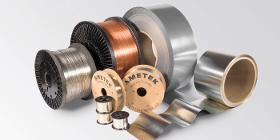
AMETEK SPECIALTY METAL PRODUCTS
United States
HPM® C 276 is a Nickel-Molybdenum-Chromium-Tungsten alloy with a high level of corrosion resistance. A low carbon content enables the alloy to resist intergranular corrosion at weld joints. These attributes make it an important alloy for the most severe chemical processing applications. such as use in metal diaphragms for aerospace sensors and burst discs. The alloy is readily formed from the annealed temper.All standard welding methods except oxy-acetylene can be used for joining. Available Sizes: HPM® C 276 is available from Hamilton Precision Metals as strip product in thicknesses From 0.0005” to 0.050” (0.0127 mm to 1.27 mm) and widths up to 12.0” (304.8 mm). The material conforms to ASTM B575 and UNS N10276.
Request for a quote
AMETEK SPECIALTY METAL PRODUCTS
United States
Unalloyed Tantalum is supplied to ASTM F560 – R05200 composition limits. Tantalum is selected for its corrosion resistance, thermal conductivity, high melting point, and ability to form a dielectric oxide film. Tantalum is very ductile and can be readily cold formed due to a low work hardening rate. Welding can be accomplished via resistance, TIG, or electron beam methods, with care taken to protect the weld and heat affected zone from air during welding. Because of the potential for hydrogen embrittlement, Tantalum can not be used for extended service in air or other oxidizing atmospheres above 260°C unless a protective inert atmosphere or vacuum is provided. Available Sizes: Tantalum is available from Hamilton Precision Metals as strip product from 0.0005” to 0.035” (0.0127 mm to 0.889 mm) in widths up to 12.0” (304.8 mm). The material conforms to UNS R05200 and meets the requirements of ASTM F560 and ASTM B708.
Request for a quote
AMETEK SPECIALTY METAL PRODUCTS
United States
Evanohm® R is a unique resistance alloy with high electrical resistivity and very low temperature coefficient of resistivity (TCR). The alloy is produced by melting and conditioning practices which result in a low level of pinholes at ultra-thin thicknesses. This combination of attributes with inherent corrosion resistance makes it suitable for a variety of strain gauge, foil heaters and airbag igniters. The alloy is supplied with 90% cold reduction which has a positive TCR of about 70 PPM/ºC. A stabilizing heat treatment (approximately 475ºC) during manufacture of finished parts adjusts the TCR to a desired value. The heat treatment virtually eliminates any drift tendency of the resistivity. A heat-treat curve for each melt is developed at Hamilton and is made available as a guide in regulating TCR. Sizes Evanohm® R is available from Hamilton Precision Metals as foil and strip product in thicknesses from 0.0005” to 0.010” (0.0127 mm to 0.254 mm) and in widths up to 12.0”
Request for a quote
AMETEK SPECIALTY METAL PRODUCTS
United States
Constantan® is a copper-nickel alloy that contains specific minor amounts of additional elements to achieve precise values for the temperature coefficient of resistivity. Careful control of melting and conversion practices results in a very low level of pinholes at ultra-thin thicknesses. The alloy is used extensively for foil resistors and strain gauges. The TCR can be adjusted from the furnished cold rolled values by using a low temperature heat treatment to achieve compensation for all types of spring elements. The foil is normally supplied with 90% cold reduction and a smooth bright surface. The foil is reasonably flat at 4” wide and nearly free of pinholes. The cold rolled foil can be produced with a TCR between +10 to –35 PPM/°C. The heat treatment will shift the foil TCR to the desired value. A typical heat-treat curve for Constantan® shows decreasing resistivity but increasing TCR with increased heat-treating temperature.
Request for a quote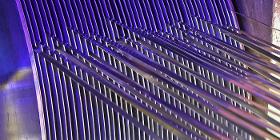
AMETEK SPECIALTY METAL PRODUCTS
United States
Cobalt-based metals are typically alloyed with chrome, nickel, iron and tungsten. They are used in challenging environments in applications that demand high temperature strength and hardness, excellent wear and corrosion resistance.
Request for a quote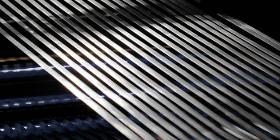
AMETEK SPECIALTY METAL PRODUCTS
United States
Ti Grade 9 is a near alpha, alpha-beta alloy, sometimes referred to as “half-6-4.” It offers 20 to 50% higher tensile strength than the commercially pure titanium at room and elevated temperatures. It is much more amenable to cold working than Ti 6AI/4V alloy and can be cold worked 75 to 85% to result in moderately high strength and good ductility The alloy can be formed from the annealed temper. Severe forming may be aided by an intermediate stress relief. Stress relieving may be appropriate after severe cold forming to remove residual stresses. Weldability and corrosion resistance is very similar to commercially pure titanium. Welding should be performed with inert gas shielded arc or spot welding.Welding with active gases, coatings, or fluxes must be avoided to prevent embrittlement.
Request for a quote
AMETEK SPECIALTY METAL PRODUCTS
United States
CP Titanium is selected for its favorable strength to weight ratio and excellent corrosion resistance. Two levels of purity permit a choice of finish strength. The alloy can be formed from the annealed temper. Severe forming may be aided by an intermediate stress relief at 1000°F. Stress relieving may be appropriate after severe cold forming to remove residual stresses. Welding should be performed with inert gas shielded arc or spot welding. Welding with active gases, coatings, or fluxes must be avoided to prevent embrittlement. Available Sizes: CP Titanium is available from Hamilton Precision Metals as strip product from 0.0005” to 0.025” (0.0127 mm to 0.635 mm) and widths up to 12.0” (304.8 mm). A foil product is available as thin as 0.000085” (0.002159 mm) and widths of 4.0” (101.6 mm) maximum. The material conforms to ASTM F67, ASTM B265, AMS 4902 and UNS R50250,R50400.
Request for a quote
AMETEK SPECIALTY METAL PRODUCTS
United States
Titanium exhibits a unique combination of properties including excellent corrosion resistance, high temperature resistance, and outstanding strength to weight ratios. Titanium is produced as commercially pure or alloyed. Commercially pure titanium is typically used in implantable medical applications whereas the titanium alloys are produced with the addition of vanadium or aluminum for applications such as aerospace. Hamilton Precision Metals processes strip and foil products in Titanium CP (Grade 1, Grade 2, Grade 4) and Titanium 3Al-2.5V (Grade 9).
Request for a quote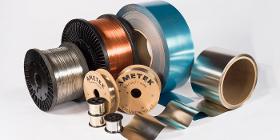
AMETEK SPECIALTY METAL PRODUCTS
United States
L-605™ is a nonmagnetic cobalt-based chromium-tungstennickel alloy that has excellent corrosion and oxidation resistance, and high strength at both room and elevated temperatures. Through work hardening, high strength levels can be obtained. L-605™ has a minimal heat treatment response, but can be used in the cold worked and aged condition. Applications include medical implant devices, springs, valves, and engine components for the aerospace industry. As a result of its high tungsten content, L-605TM is radiopaque, which is beneficial for implant medical devices, such as stents. Because of the alloy’s high work hardening rate, only minimal reductions can be taken before solution annealing will be required. L-605TM is very resistant to oxidation and scaling at elevated temperatures, and is nonmagnetic in all conditions. L-605™ is produced by vacuum induction melting followed by electroslag remelting (VIM-ESR), and as such, has a low nonmetallic inclusion level.
Request for a quote
AMETEK SPECIALTY METAL PRODUCTS
United States
Phosphor Bronze A is a Copper base spring material with a good combination of strength, formability, and corrosion resistance. The material is suitable for use in certain contact springs and diaphragms. The alloy has good formability up to moderate strength. It can be soldered, silver brazed, and resistance welded. Available Sizes: Phosphor Bronze A is available from Hamilton Precision Metals as strip products in thicknesses from 0.001” to 0.020” (0.0254 mm to 0.508 mm) in widths up to 12.0” (304.8 mm). The material conforms to ASTM B 103 and UNS C51000.
Request for a quote
AMETEK SPECIALTY METAL PRODUCTS
United States
Beryllium Copper 25 is a Copper base alloy with the capability of being strengthened by precipitation heat treatment. The alloy furnishes the best combination of electrical conductivity, corrosion resistance and mechanical strength necessary for numerous electronic and electromechanical devices. The alloy is quite satisfactory for fabrication with good formability and joining characteristics. Forming is readily accomplished from the annealed temper. Severe bending will be less successful from hard or heat treated tempers and requires large fold radius ratios. Beryllium Copper 25 is able to be soldered, brazed, and welded by most standard techniques. The brazing temperature must be kept under 1450º F and cycle time minimized to avoid loss of heat treated strength. Heat treating should be performed subsequent to welding to obtain uniform high strength. The alloy is not susceptible to an increase in magnetic attraction from plastic deformation during service
Request for a quote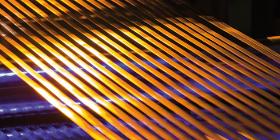
AMETEK SPECIALTY METAL PRODUCTS
United States
Shunt Manganin is a Copper-Manganese resistance alloy used for shunts in various high current applications. The alloy has a low temperature coefficient of resistivity with peak resistance at about 50°C. The thermal EMF vs. Copper is very low. The alloy can be easily formed from the annealed temper.The maximum recommended operating temperature in air is 200°F. Available Sizes: Shunt Manganin is available from Hamilton Precision Metals as strip product in thicknesses from 0.0005 to 0.053” (0.0127 mm to 1.346 mm) in widths up to 12.0” (304.8 mm). It is also available in foil as thin as 0.000100” (0.00254 mm) in widths of 4.0” (101.6 mm) maximum.
Request for a quote
AMETEK SPECIALTY METAL PRODUCTS
United States
Cu-Ni 715 is a copper-nickel alloy that is resistant to corrosion in sea water. The alloy has good fatigue strength and relatively high thermal conductivity. This alloy is used mainly for flexible metal foil heaters. The alloy is readily formed in the annealed temper, and can be joined by the standard welding, brazing and soldering processes. Available Sizes: Cu-Ni 715 is available from Hamilton Precision Metals as strip product in thicknesses from 0.0005” to 0.010” (0.0127 mm to 0.254 mm) in widths up to 12” (304.8 mm). The material conforms to ASTM B122 and UNS C71500.
Request for a quote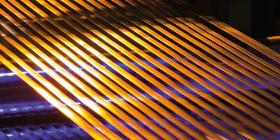
AMETEK SPECIALTY METAL PRODUCTS
United States
Copper 102 is an oxygen-free copper with extremely high electrical conductivity and good formability. These characteristics make it particularly useful for electrical connectors. Copper 102 can be deep-drawn from the annealed temper.It is corrosion resistant in normal atmosphere and water. A thin adherent oxide film forms at elevated temperatures which prevents particle contamination and enhances glass to metal seals. The Copper 102 can be readily soldered and brazed. The absence of oxygen makes welds free of inclusions. Available Sizes: Copper 102 is available from Hamilton Precision Metals as strip product in thicknesses from 0.0005” to 0.010” (0.0127 mm to 0.254 mm) in widths up to 12.0” (304.8 mm). The material conforms to ASTM B 152 and UNS C10200. It is also available in thickness less than 0.0005” (0.0127 mm) in widths up to 4.000” (101.6 mm) maximum.
Request for a quoteDo you sell or make similar products?
Sign up to europages and have your products listed
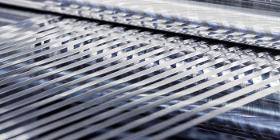
AMETEK SPECIALTY METAL PRODUCTS
United States
HPM® 965 is a high purity Nickel-Iron alloy that exhibits moderate electrical resistivity and a high temperature coefficient of resistance. This combination of electrical characteristics makes it suitable for use as a self-regulating heating element or temperature sensor, such as use in flexible metal foil heaters. The alloy can be readily formed in the annealed temper and can be joined by standard welding methods. Available Sizes: HPM® 965 is available from Hamilton Precision Metals as foil and strip product in thicknesses from 0.0005” to 0.015” (0.0127 mm to 0.38 mm) and in widths up to 12” (304.8 mm). It is also available as thin as 0.000100” (0.00254 mm) and in widths up to 4” (101.6 mm) maximum.
Request for a quote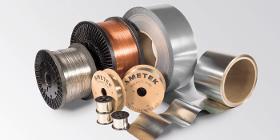
AMETEK SPECIALTY METAL PRODUCTS
United States
HPM® 80/20 AL is a resistance alloy with a unique composition that provides deep draw capability. It is used as a heating element in electronic applications. HPM® 80/20 AL has good forming characteristic and canbe deep drawn. It is not suitable for extended exposure to air at the elevated temperatures. Available Sizes: HPM® 80/20 AL is available from Hamilton Precision Metals as strip product in thicknesses from 0.0005” to 0.050” (0.0127 mm to 1.27 mm) and width up to 12.0” (304.8 mm). Foil Product may be supplied to a thickness of 0.0001” (0.00254 mm) in width up to 4.0” (101.6 mm).
Request for a quote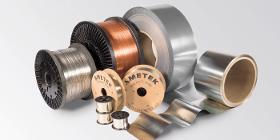
AMETEK SPECIALTY METAL PRODUCTS
United States
HPM® 80/20 A is a resistance alloy used in electric heating applications. It is recommended for use in dry air applications up to 2150°F with good hot strength. Such as, flexible metal foil heaters and airbag igniters. The alloy forms rather well and has good welding characteristic. Caution should be used to avoid extended exposure to elevated temperature in marginally oxidizing or partially reducing atmospheres as it would be susceptible to “green rot” corrosion, carburization and sulfurization. Available Sizes: HPM® 80/20 A is available from Hamilton Precision Metals as strip product in thicknesses from 0.0005” to 0.050” (0.0127 mm to 1.27 mm) and width up to 12” (304.8 mm). The material conforms to ASTM B-344. Foil product may be supplied in thickness to 0.0001” (0.00254 mm) in width up to 4.0” (101.6 mm).
Request for a quote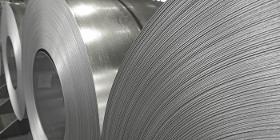
AMETEK SPECIALTY METAL PRODUCTS
United States
Samples from heat 305992 at 0.045” thick in strand annealed condition Evaluation showed strip to be HRB 91, ASTM grain size 6 Weld beads placed on annealed strip via EB welding at International Beam Welding Corp.
Request for a quote
AMETEK SPECIALTY METAL PRODUCTS
United States
HPM® Ni 52 is a Nickel-Iron alloy with a thermal expansion characteristic that corresponds to soft glass. Applications include magnetic reed switches and seals that need controlled linear expansion to about 1000°F. The alloy is readily formed or deep drawn from a fine grain annealed temper. Joining can be accomplished by conventional welding or brazing techniques. Useful magnetic characteristics can be produced from a continuous strand anneal. Available Sizes: HPM® Ni 52 available from Hamilton Precision Metals as strip product in thickness from 0.001” to 0.050” (0.0254 mm to 1.27 mm) in widths up to 12.0” (304.8 mm). The material conforms to UNS N14052.
Request for a quote
AMETEK SPECIALTY METAL PRODUCTS
United States
HPM® Ni 42 is a Nickel-Iron alloy with a thermal expansion coefficient suitable for matching to the ceramic chip in numerous miniature electronic circuits The alloy is readily formed from the annealed temper and can be welded or brazed by standard methods. The alloy is not corrosion resistant at 20°C when exposed to a moist or salt-containing atmosphere. Available Sizes: HPM® Ni 42 is available from Hamilton Precision Metals as strip product in thicknesses from 0.001” to 0.050” (0.0254 mm to 1.27 mm) in widths up to 12.0” (304.8 mm). The material conforms to ASTM F30 and UNS K94100.
Request for a quote
AMETEK SPECIALTY METAL PRODUCTS
United States
HPM® Ni 36 is a Nickel-Iron alloy with the lowest thermal expansion of any active alloy from -240°C to 330°C. It is selected when dimensional changes from temperature variation need to be minimized in electronic control devices, such as use within airbag igniters and precision metal stampings. The alloy can be readily formed from the annealed temper.Annealed hardness can be modified to approximately DPH 180 for best blanking characteristic. Grain size can be adjusted to provide the optimum deep drawing characteristic. It can be welded and brazed using conventional methods. Available Sizes: HPM® Ni 36 is available from Hamilton Precision Metals as strip product in thicknesses from 0.0005” to 0.025” (0.0127 mm to 0.635 mm) in widths up to 12.0” (304.8 mm). It is also available in foil as thin as 0.000100” (0.00254 mm) in widths of 4.0” (101.6 mm) maximum. The metal conforms to UNS K93603, ASTM F1684.
Request for a quote
AMETEK SPECIALTY METAL PRODUCTS
United States
HPM ® 270 Nickel is the highest purity Nickel. The controlled low impurity level provides uniform and repeatable mechanical, electrical, and magnetic properties. The material has excellent corrosion resistance with high thermal and electrical conductivities. A high thermal coefficient of electrical resistance makes it suitable for strain gauges, temperature sensors, and electronic components. The alloy can be formed by all conventional cold forming methods, and can be joined by resistance welding, brazing and soldering. The corrosion resistance is generally very good in most mediums, although, it is subject to intergranular embrittlement by sulfur compounds above 315°C Available Sizes: HPM ® 270 Nickel is available from Hamilton Precision Metals as strip product in thicknesses from 0.0005” to 0.020” (0.0127 mm to 0.508 mm) in widths up to 12.0” (304.8 mm). It is available as foil as thin
Request for a quote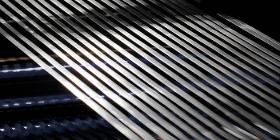
AMETEK SPECIALTY METAL PRODUCTS
United States
Precision C is a heat treatable Nickel-Iron Alloy used in critical diaphragm applications, such as, metal diaphragms for aerospace sensors and burst discs. The alloy composition provides a unique constant elastic modulus value over a temperature range of -50ºF to 150ºF. Precision C can be readily formed from the annealed temper. It has a work hardening rate similar to austenitic stainless steel. The material can be joined by TIG, EB, and resistance welding as well as by brazing and soft solder technique. The heat treatment of Precision C can be adjusted to produce the desired value for the thermoelastic coefficient at or near zero. The elevated strength in the heat treated temper results in low mechanical hysteresis and low drift. Available Sizes: Precision C is available from Hamilton Precision Metals as strip product in thickness from 0.0005” to 0.040” (0.0127 mm to 1.016 mm) and widths up to 8.0” (203.2 mm). The material conforms to ASM 5221 and UNS N09902.
Request for a quote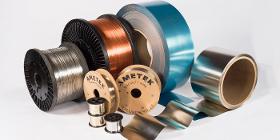
AMETEK SPECIALTY METAL PRODUCTS
United States
MP35N®-LTi is a nonmagnetic nickel-cobalt-chromiummolybdenum alloy that has excellent corrosion resistance, can obtain ultrahigh tensile strengths (300 ksi) through work hardening and aging, and has good toughness and ductility. Applications include electrical components, spring contacts, medical instruments, such as stents and implant electronic connectors, chemical, food processing and marine environments. After work hardening, MP35N® alloy can be aged in the temperature range of 800/1200°F for increased strength. MP35N® will only respond to aging if in the work hardened condition. Service temperatures up to 750°F are recommended for work hardened material. MP35N® can be successfully TIG welded. MP35N® is produced by double vacuum melting, and as such, has a low nonmetallic inclusion level. Available Sizes: MP35N®-LTi is available from Hamilton Precision Metals as strip product in thicknesses from 0.0005” to 0.030” (0.0127 mm to 0.762 mm) and widths
Request for a quote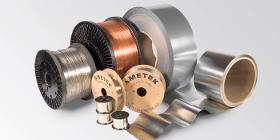
AMETEK SPECIALTY METAL PRODUCTS
United States
HPM® X-750 is a precipitation –hardenable nickelchromium alloy which is well suited for a wide range of corrosive and oxidizing environments where strength must be maintained to elevated temperatures. The alloy composition provides a product which performs well at elevated temperatures up to 1300° Farenheit. The strength can be increased by heat treatment. The alloy is readily formable in the annealed temper and can be joined by the standard welding and brazing processes. Available Sizes: HPM® X-750 is available from Hamilton Precision Metals as strip product in thicknesses from 0.001” to 0.025” (0.0254 mm to 0.635 mm) in widths up to 12.0” (304.8 mm). The material conforms to AMS 5542, AMS 5598 and UNS N07750.
Request for a quote
AMETEK SPECIALTY METAL PRODUCTS
United States
HPM® Beryllium Nickel is a Beryllium-Nickel alloy capable of high strength through precipitation heat treatment. The excellent spring characteristics to 550°F make it suitable for many of the most demanding electromechanical devices. The alloy can be readily formed and even deep drawn from the annealed temper. Cold rolled tempers prior to heat treatment can be blanked and folded provided a radius to thickness ratio approaches 2.0. The optimum heat treatment for highest strength is 925ºF for 2 hours. The material can be joined using conventional TIG methods, silver brazed and soldered. Available Sizes: HPM® Beryllium Nickel is available from Hamilton Precision Metals as strip product in thicknesses from 0.0005” to 0.025” in (0.0127 to 0.635 mm) widths up to 7.0” (177.8 mm). A foil product is available as thin as 0.000085” (0.002159 mm) and widths of 4.0” (101.6 mm) maximum. The material conforms to UNS N03360.
Request for a quoteResults for
Foils - Import exportNumber of results
52 ProductsCountries
Company type